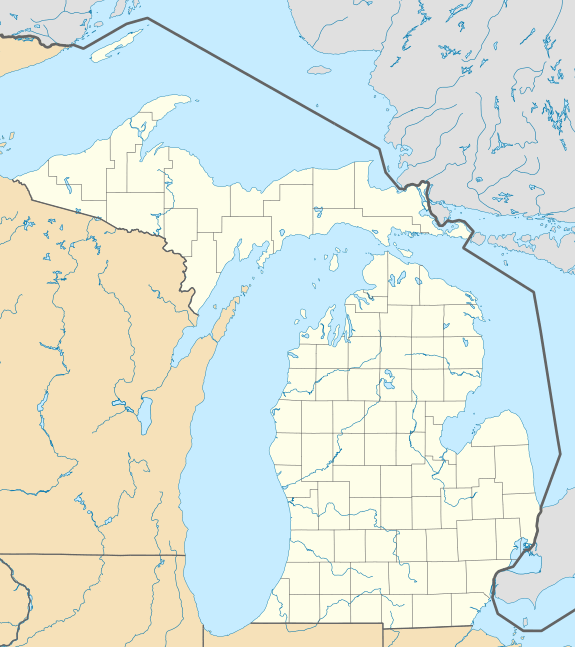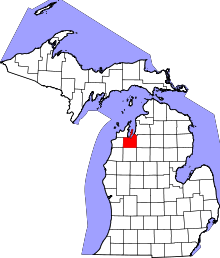Long Lake Township, Michigan
| Long Lake Township, Michigan | |
|---|---|
| Township | |
 Long Lake Township, Michigan Location within the state of Michigan | |
| Coordinates: 44°43′51″N 85°45′36″W / 44.73083°N 85.76000°WCoordinates: 44°43′51″N 85°45′36″W / 44.73083°N 85.76000°W | |
| Country | United States |
| State | Michigan |
| County | Grand Traverse |
| Area | |
| • Total | 35.6 sq mi (92.3 km2) |
| • Land | 30.1 sq mi (78.0 km2) |
| • Water | 5.5 sq mi (14.3 km2) |
| Elevation | 879 ft (268 m) |
| Population (2010) | |
| • Total | 8,662 |
| • Density | 254.0/sq mi (98.1/km2) |
| Time zone | Eastern (EST) (UTC-5) |
| • Summer (DST) | EDT (UTC-4) |
| FIPS code | 26-49240[1] |
| GNIS feature ID | 1626640[2] |
Long Lake Township is a civil township of Grand Traverse County in the U.S. state of Michigan. The population was 8,662 at the 2010 census, an increase from 7,648 at the 2000 census.
Geography
According to the United States Census Bureau, the township has a total area of 35.6 square miles (92 km2), of which 30.1 square miles (78 km2) is land and 5.5 square miles (14 km2) (15.52%) is water.
History
The Long Lake township area was initially settled in 1862 when Ira Chase and his brother-in-law Eliphalet Fillmore traveled from Whitewater township to Grand Traverse County to select land. The next few years saw the gradual influx of families who cleared forested areas to establish farms. An annual cycle of farming in the summer, logging in the winter, and maple sugaring in the spring began. The end of the Civil War brought additional settlers and in November 1866 a group of men petitioned the Board of Supervisors of Grand Traverse County to form "Viola" township. In January 1867, Long Lake Township was formally organized.
The population of the township was 333 in 1870, rising to 434 in 1880. The most notable historical incident in the early 1870s was the probable murder of John Eley, his wife Philopena, and their two daughters in July 1871. The family disappeared and neighbors later discovered blood on the walls of the family's house. A hired hand, William Benton, was the prime suspect, since he claimed to have been sold the Eleys' farm. The case was never solved.
In the late 1870s, members of the Society of Friends (Quakers) began to move to the township from Indiana. A smaller number of people from Bohemia also settled in the area. The township's population was 663 persons in 152 households in 1900.
Farming continued to be the primary source of income. The rise of the auto industry in the late 1910s to 1920s led many younger people to leave the area to settle in the Detroit and Flint areas of Michigan. Today, many residents of Long Lake township are retirees or commute to work in Traverse City.
Demographics
As of the census[1] of 2000, there were 7,648 people, 2,742 households, and 2,111 families residing in the township. The population density was 254.0 per square mile (98.1/km²). There were 3,210 housing units at an average density of 106.6 per square mile (41.2/km²). The racial makeup of the township was 97.19% White, 0.26% African American, 0.72% Native American, 0.44% Asian, 0.26% from other races, and 1.12% from two or more races. Hispanic or Latino of any race were 0.93% of the population.
There were 2,742 households out of which 42.6% had children under the age of 18 living with them, 66.6% were married couples living together, 7.5% had a female householder with no husband present, and 23.0% were non-families. 16.6% of all households were made up of individuals and 4.3% had someone living alone who was 65 years of age or older. The average household size was 2.77 and the average family size was 3.15.
In the township the population was spread out with 29.5% under the age of 18, 7.3% from 18 to 24, 32.1% from 25 to 44, 22.6% from 45 to 64, and 8.6% who were 65 years of age or older. The median age was 36 years. For every 100 females there were 102.1 males. For every 100 females age 18 and over, there were 99.0 males.
The median income for a household in the township was $48,826, and the median income for a family was $55,386. Males had a median income of $37,303 versus $26,920 for females. The per capita income for the township was $21,943. About 2.7% of families and 3.0% of the population were below the poverty line, including 2.3% of those under age 18 and 5.9% of those age 65 or over.
